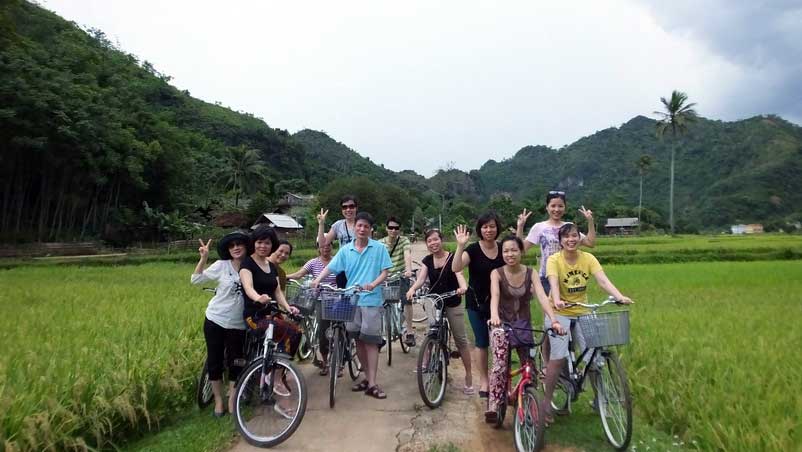
(HBO) - On the occasion of the Independence Day 2nd September, I with my friends travelled to the beautiful Mong village in Hang Kia commune (Mai Chau). We stayed at the Sung Y Mua’s homestay of Hang Kia village. This is the first time I witnessed the bustling atmosphere of enjoying the Independence Day of the Mong ethnic people, all the houses killed the buffalos, pigs and made many kinds of cakes, etc. Mong ethnic guys and girls dressed in colorful costumes to the market.

Tourists experience cycling to explore the
village of Thai ethnic people in Hich village, Mai Hich commune (Mai Chau).
Visitors are not only immersed in the scenery
and culture of the Mong ethnic village of Hang Kia commune, but also feel
interested in exploring and sightseeing to the homestay tourist destinations in
the province. On the occasion of the Independence Day 2nd September, on the
bending route of Road 6, we can easily catch the images of each other delegation
of visitor coming to the beautiful villages of Hoa Binh province.
The community- based tourism of Hoa Binh
province attracts visitors by the beautiful natural sceneries of the river and
the forest. The rooftops of stilt houses, the flowing streams are all simple
and rustic; creating the unique character of the community- based tourism
villages. The culture and customs of the Dao, Muong, Thai and Mong ethnic
people have become an attraction to tourists. Whoever comes once will want to
come back more. Tourists would have a chance to have meals, stay with and work
with the local people. These unforgettable experiences help indigenous people
and tourists to be close together. People seem to join together to share
culture and customs to better understand the cultural value of the ancient
ethnic minorities. At present, there are 150 homestay households in Da Bac, Cao
Phong, Tan Lac, Lac Son, Yen Thuy and Mai Chau districts. These are the famous
community tourism business of the province.
Mai Chau is one of the places attracting a
large number of visitors on the occasion of the Independence Day 2nd September.
According to Mai Chau District Culture and Information Board, there are 103
homestay households in the whole district. Only on the traditional holiday of 2ndSeptember, the district expected to attract more than 10 thousand visitors,
including 3600 visitors of international visitors and 6,400 people of domestic
visitors. The total revenue is estimated to be about 3.4 billion VND.
Da Bac district has pinpointed culture as a key driver of tourism development, a direction clearly outlined in the Resolution of the 25th district Party Congress for the 2020-2025 tenure.
Go Lao waterfall in Go Mu hamlet, Son Thuy commune, Mai Chau district is a hidden gem of the northern mountainous province of Hoa Binh.
In the first 9 months of 2024, Hoa Binh province continues to implement the expanded tourism development cooperation program plan of 8 Northwest provinces with Ho Chi Minh City; deploying digital transformation content in tourism and developing a smart tourism province. Hoa Binh province received about 3.6 million views, an increase of 7.9% over the same period. In which, international visitors are about 380 visitors, domestic visitors are estimated at 3 million 220 visitors.
Spanning thousands of hectares and winding gracefully along mountain slopes, hillsides, and riverbanks, the terraced rice fields of Lac Son District present a stunning and captivating beauty. This region, renowned for its remarkable terraced landscapes, is also the centre of Hoa Binh Culture known for numerous archaeological sites.
The life of Mong people in Hang Kia and Pa Co communes of Mai Chau district has improved much thanks to tourism development.
The man-made Hoa Binh Lake, with a water surface area of approximately 9,000 hectares and a capacity of 9.45 billion cubic meters, stretches over 200 kilometers from Hoa Binh to Son La provinces. With the goal of developing into a national tourism area, the Hoa Binh Lake tourism area is expected to not only become the largest tourism centre in the province but also one of the 12 key tourist destinations in the northern midland and mountainous region of Vietnam.



